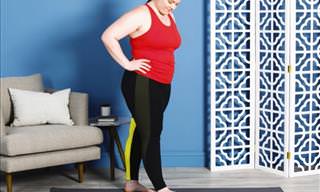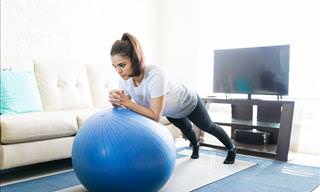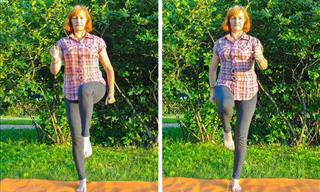Recovering from Covid-19 or experiencing long-term effects from an infection isn’t easy. Some people can feel anxious to get back to their normal routine, which may include exercise. This is normal and understandable; being active has huge mental and physical health benefits. Being smart about starting to work out after Covid-19 is crucial. If done correctly, it can actually help you recover quicker. Below, we share a few expert tips on when and how to begin exercising again after a Covid-19 diagnosis, as well as a few easy exercises to start with.
When is it safe to start exercising again?
Covid-19 affects everyone differently. While there are general guidelines on when it’s safe to start working out again, it all depends on the severity of the disease and the symptoms a patient has been experiencing in the course of the illness.

The one rule all experts stress is to wait until all symptoms of Covid-19 are gone before starting light to moderate exercise. This typically takes anywhere between 10 and 14 days. What about those who tested positive but are asymptomatic? If that is the category you belong to, you might be itching to get moving as soon as possible.
However, even asymptomatic patients should err on the side of caution and take it easy until full recovery. According to Brain Grawe, an orthopedic surgeon and assistant professor of medicine at the University of Cincinnati College of Medicine, everyone who tests positive for Covid-19 must rest for a minimum of 10 days, regardless of their symptoms.
When you’re ready to incorporate exercise into your routine again, it’s important to do it slowly and gradually with low-impact activities. Health experts recommend staying below 50 percent of your maximum exertion rate in the first week, followed by 30 percent in the following weeks. The important thing is to be attentive and patient with your body. Even individuals who are normally very active may need a graduated return to their usual fitness routine, which could occur over several months rather than weeks. Patience is key. Here are a few simple exercises to get you started:
1. Walking
Walking is one of the easiest ways to begin regaining your strength and fitness after recovering from Covid-19. At first, start with short and realistic goals. For example, go on a 10-15 minute walk and add a bit of distance and speed every week. After 6 weeks, you should be walking for at least 30 minutes a few times a week. The pace should be reasonably fast to get your heart rate up, but you should still be able to walk and talk.
Related: These Mistakes Might Be Making Your Walks Less Effective
2. Get moving around the house
It’s easy to become accustomed to prolonged bed rest or sitting activities when you’re ill, but slowly getting back into motion at the beginning of your recovery is essential. Make sure you get up and move around the house regularly. For example, if you’re watching a show, walk around the house or get in a few stretches during the commercial break.
3. Toe Lifts
This exercise is excellent for getting your lower body moving again and can be easily done at home with no special equipment.
- Start by standing upright by the countertop or another sturdy surface for balance.
- Raise your heels so that you’re standing on your toes, then lower them back down.
- Repeat 20 times.
4. Seated rowing arms
Here's another simple exercise you can do at home. The rowing movements will activate your upper body and core muscles, including your upper back, arms, shoulders, and abdominal muscles.
- Sit up tall in a chair.
- Extend your arms out in front of you.
- Pull your elbows back behind you, squeezing your shoulder blades together at the end of the movement.
- Remember to keep your chest up throughout this exercise.
- Repeat 20 times.
Related: This Seated Core Workout Is Perfect for Seniors and Beginners
5. Yoga
Testing positive for Covid-19 and living during a pandemic, in general, has a mental toll. Yoga encourages mindfulness, which makes it a beneficial exercise for those in recovery. A few helpful beginner guides can be found on our site here: The Ultimate Yoga Collection: Find Your Perfect Yoga Practice.
As you go through the motions, pay attention to the signals your body is sending you and take a break if you begin to feel tired or out of breath.
6. Deep breathing exercises
One of the symptoms that is most commonly associated with Covid-19 is shortness of breath. It can definitely be a scary experience, but one thing that can help in your physical and mental recovery is breathing exercises. “Deep breathing can help restore diaphragm function and increase lung capacity. The goal is to build up the ability to breathe deeply during any activity, not just while at rest,” explained physical therapist Peiting Lien.

Deep breathing techniques can also ease feelings of anxiety and stress. While they play an important role in the Covid-19 recovery process, they can also be beneficial for anyone.
- Lie on your back and bend your knees so that the bottom of your feet are resting on the bed.
- Place your hands on top of your stomach or wrap them around the sides of your stomach.
- Place your tongue on the roof of your mouth.
- Breathe in through the nose and pull air down into your stomach where your hands are. Try to spread your fingers apart with your breath.
- Slowly exhale your breath through the nose.
- Repeat deep breaths for one minute.
- The exercise would initially be done while lying on your back, then on your stomach, sitting down, and eventually standing up. When lying on your stomach, place your head on your hands to allow room to breathe.
If you experience any of the following symptoms while exercising, stop immediately and consult your healthcare provider:
- Shortness of breath or abnormally rapid breathing
- Fever
- Excessive level of fatigue
- Tunnel vision or loss of vision.
As mentioned above, pacing yourself and being patient with your body are the most important things to remember as you begin exercising again after recovering from Covid-19. Remember that one person’s mile is another person’s marathon, so there is no need to compare yourself to anyone else, and that includes your former self.
Share these tips with those who would find them useful
 Go to BabaMail
Go to BabaMail























































